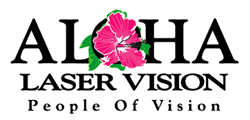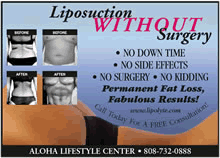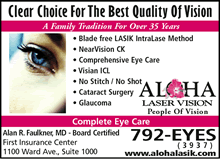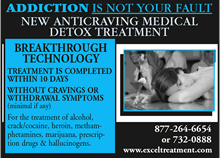CONCERNS ABOUT LASIK?
Wednesday - May 14, 2008

If you’ve been reading or seeing too many negative reports in the media about LASIK surgery, here are some facts you should know. Nearly a decade after the FDA approved the first devices for laser vision correction, its Ophthalmic Device Panel convened a hearing last month to examine the status of LASIK today. They heard public testimony from individuals who had experienced adverse outcomes, as well as from optometrists, ophthalmologists, therapists, and attorneys. Although the reports focused on the dissatisfaction of a few patients, the FDA reaffirms that LASIK is both safe and effective.
Unfortunately, the media chose to concentrate on the negative outcomes of a select few rather than the overwhelming satisfaction of the majority of patients. A literature review by the American Society of Cataract and Refractive Surgeons (ASCRS) indicated that more than 95.2% of patients in the US were satisfied with their post-operative vision; globally, approximately 95% of patients were satisfied with their LASIK results.
Despite the often dramatic testimony of some dissatisfied patients, the FDA panel was not convened as a referendum on LASIK, according to Dr. Weiss, committee chairperson. “I think some of you came here today, and I know that some of the press had touted this meeting as a referendum on LASIK,” Dr. Weiss said. “It appears to me from hearing what was said today that this really has been a referendum on the performance of LASIK by some surgeons who should be doing a better job. And I hope and feel that in general will help you get the answers to some of this, and the FDA and the organizations will help in terms of getting further information to try to make things better for future patients, so your testimony here has been of value, and we thank you.”
It’s important to understand the factors associated with maximizing a positive experience with your laser vision correction procedure. As with any surgery, risks do exist. The key is in determining who is a good candidate, what technology will be used, and the experience of the surgeon.
Some patients are just not candidates for LASIK surgery; maybe their corneas are too thin, their eyes too dry, or their nearsightedness too severe. Maybe their expectations are too unrealistic. When choosing a laser center, it’s important to find a surgeon who is qualified to evaluate the patient for all options, and recommend the procedure that best fits his or her needs. Ideally, the surgeon should meet and examine the patient preoperatively to discuss treatment options, as well as the risks and benefits. The surgeon should also be available to address any postoperative issues.
Technology is another consideration when choosing a laser center. Some centers still use conventional LASIK which produces good results for lower corrections. However, this older technology has resulted in higher instances of complaints with glare, halos and decreased night vision. Newer laser technologies like the Allegretto Wave Laser incorporate either wavefront optimized or wavefront guided treatment patterns that minimize the risk of night glare, often improving night vision when compared to contact lenses or glasses. The difference between conventional versus wavefront LASIK is like comparing regular television to high definition TV.

At Aloha Laser Vision, we take pride in bringing the best technology available to the islands. Over 4 years ago, we were the first in Hawaii to use the femtosecond laser instead of the traditional microkeratome blade to create the corneal flap during the first step of LASIK surgery. The IntraLaseFS (femtosecond) laser is safer and more precise, dramatically reducing the risk of complications and improving visual outcomes.
There is no question as to LASIK’s safety and effectiveness. In fact, the FDA holds that nearly all LASIK patients are satisfied with their procedure. LASIK is the #1 elective surgery in the US today with nearly 12.4 million procedures performed to date.
At Aloha Laser Vision, we are committed to advancing our technology and surgical techniques so that we can continue to enhance our patients’ quality of life. If you are considering vision correction options, we encourage you to call 792-EYES (3937) to schedule your free consultation with Dr. Alan Faulkner.
Call today for your Free LASIK CD-rom
E-mail this story | Print this page | Comments (0) | Archive
Most Recent Comment(s):



















